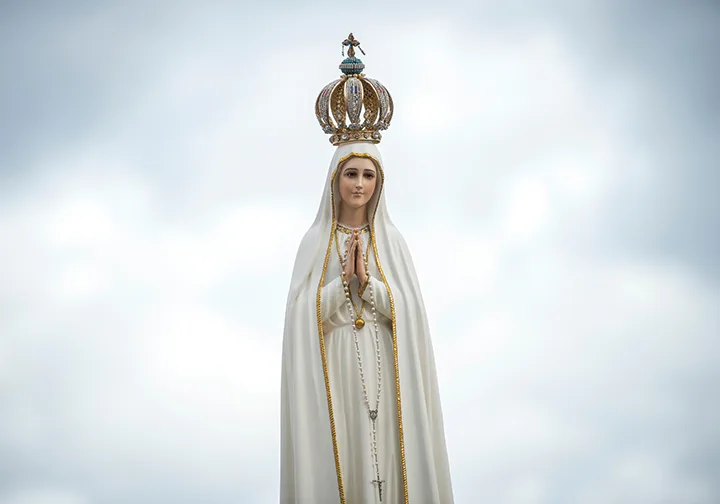
by Joe Bollig
joe.bollig@theleaven.org
KANSAS CITY, Kan. — During this time of Eucharistic Revival announced by the bishops of the United States, some people have resolved to go to daily Mass — even Saturdays.
For other Catholics, Saturday Mass is nothing new.
They’ve been going to Mass on the first Saturdays of five consecutive months for years. It’s part of a devotion called the “Five First Saturdays.”
This venerable devotion — which consists of the Mass and a few things more — has its origins in the apparitions of Our Lady of Fatima.
The apparitions began with an angel appearing to three children near Fatima, Portugal, in spring 1916. This was followed by a first appearance of Our Lady of Fatima on May 13, 1917, and then five more apparitions, the last on Oct. 13, 1917.
It was during the third apparition on July 13 that Our Lady gave the children a “secret” in three parts. She asked the children for prayers in devotion to her Immaculate Heart, the consecration of Russia to her Immaculate Heart and the First Saturdays devotion. Our Lady reiterated her request to the only surviving child, Sister Lucia dos Santos, on Dec. 10, 1925.
These devotions are done on the first Saturdays of five consecutive months, with the intention of reparation for blasphemies against Our Lady’s Immaculate Heart, and include the following elements:
• Receive the sacrament of reconciliation eight days prior to or shortly after the First Saturdays.
• Attend Mass on the first Saturdays of five consecutive months and receive the Eucharist in a state of grace.
• Recite five decades of the rosary sometime during the day.
• Meditate for 15 minutes on the mysteries of the rosary.
“Saturday has long been dedicated to commemorating the Blessed Virgin Mary and as a singular day of devotion to her,” said Michael Podrebarac, archdiocesan consultant for liturgy and sacramental life.
“In the messages received by the children at Fatima, Mary asked that people express their devotion to her and acceptance of her message. . . . It’s a practical way to dedicate one’s intentions to the prayerful assistance to Our Lady in heaven through her Immaculate Heart,” he said.
The Blessed Virgin Mary always directs us to do the will of her son Jesus, and so the First Saturdays devotion helps us to strive to live a life in imitation of Jesus. Also, the devotion is fitting because Mary is a powerful intercessor for us before the throne of Jesus in heaven, and is our mother, too.
“I think it also involves being open to the ‘spirit of Mary,’ to open ourselves to the way Mary does things — always being open to her Son, always being open to the will of God, treasuring the mysteries of salvation in her heart,” said Podrebarac. “We can do those things, too.”
The term “reparation” means to make amends for a wrong, and this is an important thing that some Catholics may not understand.
“A prayer of reparation is simply an invocation of mercy,” said Podrebarac. “I can make reparation for the sins of my neighbor — not that I can make up for or undo them, but I can help by my prayer to do what is possible to set things right. And the only way is through the Lord’s mercy and grace. Prayers of reparation are specifically asking that mercy and grace be applied to the situation.”
Mary is the perfect ambassador of Christ, he said. Where he is wounded by our sins, she is wounded. Where he is grieved by our sins, she is grieved.
There are many benefits to keeping the First Saturdays devotion, said Podrebarac. It places us in greater communion with Our Lady, it shows concern for our soul and others, it enables us to cooperate in the divine mission of Jesus and is good spiritual discipline.
“It’s something we can do that is very concrete that has a simple and direct objective and is not hard for us to do, although it requires us to commit some sacrifice,” said Podrebarac. “Prayer is simply good for our souls. It’s nourishment for our spiritual lives.”






